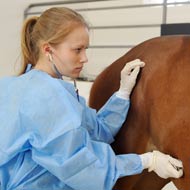Equine practice 'must adapt to family life'

"Choosing to be an equine vet shouldn't go hand in hand with giving up the rest of your life."
Equine practice needs to become more compatible with family life, according to BEVA members who took part in a 'moral maze' debate.
During the recent BEVA Congress, 92 per cent of members said the profession should adapt to offer better work-life balance.
BEVA believes this shift in attitudes could be due in part to the changing demographics of the profession - female vets now account for 76 per cent of new graduate intakes.
New president Mark Bowen said: "I'm not surprised that 92 per cent of voters supported the motion, given the fact that the recent VetFutures survey has shown a high rate of job dissatisfaction in equine practice.
"It reiterates the importance of moving with the times to evaluate the needs of working parents and make the equine veterinary workplace more adaptable to family life."
Delegates contended that by working smarter rather than harder, it is possible to have good work-life balance and be an effective vet in a successful equine practice.
Carolyne Crowe, a veterinary coach and mentor, said: "Choosing to be an equine vet shouldn't go hand in hand with giving up the rest of your life. Allowing flexibility within job roles should result in more engagement, productivity and thus economic benefit for the practice."
Job share was cited as a possible solution. In order to meet the level of consistency demanded by clients, it was suggested two vets of equal calibre could be introduced to the client from the outset.
Members of the audience offered examples of successful job sharing, concluding that the turnover generated by part time, job share employees is often higher than their full time equivalents.
BEVA says it is working on various projects to help address the needs of members seeking a better work-life balance. Further information on other initiatives will be announced towards the end of the year.



 The Animal and Plant Health Agency (APHA) has updated its online reporting service for dead wild birds.
The Animal and Plant Health Agency (APHA) has updated its online reporting service for dead wild birds.